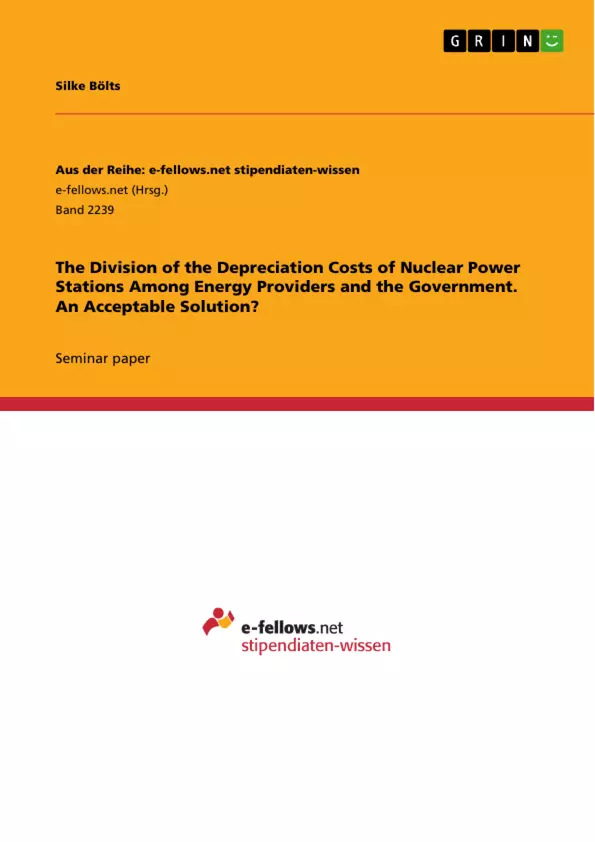In 2001, the German coalition of the Green Party (Bündnis 90/ Die Grünen) and the Social Democrat Party (SPD) decided in consensus with all the other parties in the parliament, to end its involvement in atomic power. The consensus between politics and the energy providers entailed the structured withdrawal from nuclear energy. Therefore, a law was passed by the parliament in 2002, called “Gesetz zur geordneten Beendigung der Kernenergienutzung zur gewerblichen Erzeugung von Elektrizität”.
However, the government that followed (CDU/CSU and FDP) under Chancellor Angela Merkel first decided to extend the use of atomic power stations to an average of twelve extra years. But after the atomic accident in Fukushima, Japan in 2011, this decision was withdrawn. Instead, the coalition decided on a suspension of the oldest power stations and the phase-out of all stations by 2022.
It goes without saying that not all stakeholders have been in favour of this decision. Especially the four largest German energy provider companies RWE, Vattenfall, E.ON and EnBW, who were all severely affected and are therefore trying to find ways to improve their situation.
As ethics is a science that seeks to come closer to the truth by reflecting different options in a structured way3, the characteristics of a dilemma will be explained after an introduction to the topic. Then, the relationship of the topic to sustainability will be elaborated on. Subsequently, the question about the appropriateness of the decision by the commission will be discussed by comparing funding options for the withdrawal from nuclear energy, arguments in favour and against monetary support by the state. Then, the decision of the commission will be reviewed with regard to different concepts of ethics before being summarized in the conclusion.
Inhaltsverzeichnis (Table of Contents)
- Introduction
- Depreciation costs as a sustainability-dilemma
- Discussion
- Arguments against financial support by the state
- Arguments pro financial contribution to the companies
- The decision of the commission
- Ethical reflection
- Conclusion
Zielsetzung und Themenschwerpunkte (Objectives and Key Themes)
This essay aims to analyze the ethical implications of the decision regarding the depreciation costs of nuclear power stations in Germany, specifically focusing on the dilemma of finding an acceptable solution that balances the needs of energy providers and the government. The essay explores the complex relationship between sustainability, economic responsibility, and ethical principles.
- The Sustainability Dilemma of Nuclear Power Phase-Out
- The Polluters-Pay-Principle and its Limitations
- Ethical Perspectives on Financial Support for Energy Companies
- Intergenerational and Intragenerational Justice in the Context of Nuclear Energy
- The Role of Sustainability Ethics in Addressing Complex Environmental and Economic Issues
Zusammenfassung der Kapitel (Chapter Summaries)
The introduction sets the stage for the discussion by outlining the historical context of Germany's decision to phase out nuclear power and highlighting the ethical implications of this complex issue. The second chapter delves into the concept of depreciation costs as a sustainability dilemma, outlining the different types of costs involved and the challenges of balancing economic responsibility with environmental concerns. The third chapter explores the arguments for and against state financial support for the energy companies, examining the perspectives of various stakeholders and the complexities of the polluters-pay-principle.
Schlüsselwörter (Keywords)
The main keywords and focus topics of this essay include sustainability, nuclear energy, depreciation costs, ethical dilemmas, polluters-pay-principle, intergenerational equity, intragenerational equity, and the German energy sector.
Frequently Asked Questions
What is the "Sustainability Dilemma" of the nuclear phase-out?
The dilemma involves balancing the economic responsibility of energy providers with the government's role and environmental goals, especially regarding the massive depreciation costs of power stations.
How did German politics change regarding nuclear energy after 2011?
After the Fukushima accident, the German government withdrew its plan to extend nuclear power use and instead decided on a complete phase-out by 2022.
What is the "Polluters-Pay-Principle"?
It is an ethical and legal principle stating that those who produce pollution should bear the costs of managing it to prevent damage to human health or the environment.
Who are the four largest energy providers affected in Germany?
The major companies affected by the nuclear phase-out decision are RWE, Vattenfall, E.ON, and EnBW.
How does intergenerational justice relate to nuclear power?
It raises the ethical question of whether current generations should benefit from nuclear energy while leaving the costs and risks of waste management to future generations.
- Quote paper
- Silke Bölts (Author), 2016, The Division of the Depreciation Costs of Nuclear Power Stations Among Energy Providers and the Government. An Acceptable Solution?, Munich, GRIN Verlag, https://www.grin.com/document/351646



